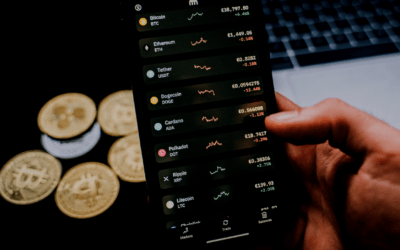If you have taken steps to invest in cryptocurrency, or are considering doing so in future, then you may be wondering whether you need to pay tax on your investments, how much will be due and how HMRC views cryptocurrencies such as Bitcoin.
In this article, we have provided a guide to understanding UK crypto tax, which should cover all you need to know in simple terms. Find out what cryptocurrency is, how crypto capital gains tax and crypto income tax could apply to you and how you can reduce your cryptocurrency tax bill.
What is cryptocurrency?
Cryptocurrency, or crypto as it also known, is any form of currency that exists digitally or virtually. Cryptography is used to secure transactions which prevents counterfeiting and fraud.
Cryptocurrencies don’t have a central issuing or regulating authority such as a bank or government, and instead they use Distributed Ledger Technology (DLT) to manage cryptocurrency transactions. DLT is a decentralised database and the most well-known system is blockchain which was launched in 2008. A number of other cryptocurrencies have since been created, including Ethereum and Litecoin.
Many people buy and sell crypto as an investment, but it is also possible to purchase goods and services using it. However, cryptocurrency is not widely accepted as a means of exchange or recognised as a unit of account and is therefore not recognised as currency or money.
How is cryptocurrency taxed?
Cryptocurrency is subject to either Capital Gains Tax or Income Tax as there is no specific Bitcoin tax or cryptocurrency tax in the UK. The tax due is determined by the transactions being made with the crypto.
If you are making an income then you will be liable to Income Tax, and if you are making a capital gain, then you will be liable to Capital Gains Tax (CGT).
Determining the location of Cryptocurrency
This is important when it comes to establishing the tax position for non-domiciled individuals.
In most cases, location is determined by the residency of the owner. This is because cryptocurrency is digital in form and does not usually have a physical location. While this provides a practical solution in most cases, there is some debate around this position as inconsistencies can arise – when for example the same cryptocurrency is owned by two separate individuals living in different countries.
However, on the rare occasions when the location of the underlying asset of the cryptocurrency is identifiable then this would determine the location.
Paying Capital Gains Tax on Crypto gains
In most cases, the buying and selling (or disposing of) crytocurrency for personal investment is viewed as a capital asset by HMRC. For this reason, most individuals will pay Capital Gains Tax on any profit made from the disposal of their crypto.
For some miscellaneous receipts relating to crypto investment such as Airdrops, Forks, Mining, Staking and Loan Interest, you will be liable to Income Tax, and these are mentioned further down.
Units of cryptocurrency are defined by HMRC as ‘tokens’, and disposal of these tokens could include:
- selling them for money (GBP or another fiat currency)
- exchanging/trading them for another type of cryptocurrency
- spending them on goods or services
- gifting them to another person (excluding gifting to a spouse or civil partner)
So, whenever you sell, exchange, spend or gift crypto you will need to pay CGT. However, you will only need to pay tax when you have made a profit or ‘gain’, and like other assets, you are entitled to a tax-free allowance.
Currently, the 2022/23 CGT tax allowance is £12,300. Your total earnings and tax status will determine the rate at which you pay CGT tax. Basic rate taxpayers are charged at 10%, and higher and additional rate taxpayers are charged at 20%.
CGT ‘Pooling’ Rules
To help with CGT calculations, HMRC has a system of ‘pooling’, whereby each type of token enters its own ‘pool’, and each has its own ‘pooled allowable cost’ associated with it. All transactions of an asset must be included in the calculations, even when the transactions are spread across various wallets.
Multiple records may therefore be needed for the process of pooling and if a vast number of transactions are made each year, then the calculations can be complex and time consuming. It is also important to export transaction records from time to time as they may only be held in wallets for a limited time. This avoids important data being lost which may be required for HMRC filing or enquiries.
The same cryptocurrency purchased and sold on the same day cannot enter the pool as those transactions are matched. The cryptocurrency is also matched and does not enter the ‘pool’ if it is re-purchased within 30 days of a sale. The process of pooling is quite complicated, and it is generally advisable to speak to your accountant.
Calculations involving Foreign Currency
The records, calculations and reporting required by HMRC must be in GBP. Therefore, even if the value of the asset expressed in a non-UK currency remains the same, it is possible for capital gains to arise when exchange rates move.
Additionally, if the value is recorded in different cryptocurrencies, a double conversion will be need (for example – Bitcoin value to USD, USD to GBP). For these reasons, foreign currency values can add further complexity to the required calculations.
Cryptocurrency and Income Tax
Income Tax on profits made when disposing of cryptoassets will only apply if the individual is considered to be trading, and the threshold for this is relatively high. In each case, it will depend on specific circumstances such as frequency of transactions, organisation and sophistication, but generally speaking, there are few cases where HMRC will consider that an individual is trading in cryptoassets.
However, as mentioned previously, there are a number of miscellaneous receipts related to crypto investment, and some of these will be treated as miscellaneous income.
- Airdrops – sometimes crypto start-ups give away tokens free of charge to help raise awareness (like supermarket member rewards), or for activities such as sharing on social media. This is taxed as miscellaneous income
- Forks – a fork is when there is a change in the operation of a blockchain. A ‘soft fork’ relates to a change in the existing blockchain and generally has no tax consequences, A ‘hard fork’ relates to a split in the blockchain, which creates new crypto and this is then subject to CGT if it is later sold.
- Mining – this is the process by which new cryptocurrency is generated and transactions involving new coins are validated. This is taxed as miscellaneous income.
- Staking –existing crypto is put to work to validate transactions and earn a passive income. This is taxed as miscellaneous income.
- Loan interest – there are various ways in which cryptocurrency can be deposited to earn crypto in the same currency as that deposited or in alternative currencies. This is also taxed as miscellaneous income.
Tax rates for Cryptocurrency Income
The usual income tax rules and rates apply when considering crypto income. All individuals have a personal allowance of £12,570, and income tax is due when your total income exceeds this allowance. Note that if your total income exceeds £100,000, your personal allowance may be restricted.
Additionally, the first £1,000 of miscellaneous income will be covered by the ‘trading allowance’, assuming that it has not already been used against other income.
Recording Transactions
We recommend that all our crypto tax clients to use a Koinly account, which we can offer at a substantial discount, from the listed prices. A Koinly account links automatically to your wallets and record the minutiae of your transactions, so that you have easy access to details of every single transaction in advance of completing your returns.
Cryptocurrency Tax Deadlines
Your cryptocurrency gains can either be reported on your annual self-assessment tax return or by using HMRC’s Capital Gains Tax real time service.
Any miscellaneous income above £1,000 should also reported on a self-assessment return. Payment of Capital Gains Tax and Income Tax is normally due by 31 January following the end of the year of assessment.
HMRC states that you must keep records of all cryptocurrency transactions, and this includes:
- type of cryptoasset
- date of transaction (disposal)
- how many assets/tokens were disposed of
- how many assets/tokens you have left
- value of the transaction in pound sterling
- bank statements and wallet addresses
Reducing tax owed on cryptocurrency
HMRC provides some examples of allowable expenses in its Cryptoassets Manual and these may help to reduce the amount of tax you need to pay. The examples suggested include:
- the consideration (in pounds sterling) originally paid for the asset
- transaction fees paid for having the transaction included on the distributed ledger
- advertising for a purchaser or a vendor
- professional costs to draw up a contract for the acquisition or disposal of the tokens
- costs of making a valuation or apportionment to be able to calculate gains or losses
Further advice on Cryptocurrency Taxes
As with all areas of tax, the Kingston Burrowes team can support you if you are investing in or disposing of cryptocurrency and need advice on tax planning to help reduce your tax bill. Get in touch with our friendly team to discuss your requirements.




